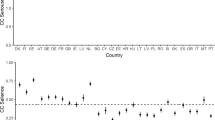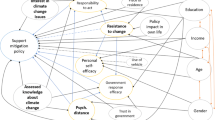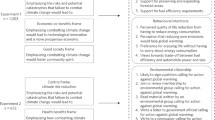Abstract
The aim of this study is to test the Campbell paradigm (Kaiser et al. 2010) as a novel theoretical framework for the measurement of concern about global climate change and to compare this measurement approach with conventional assessment of GCC concern which is based exclusively on evaluative rating of global climate change concern. Using survey data from 28 European countries (N = 27,919), we find that GCC concern can be inferred not just from evaluative statements related to GCC, as is done in conventional measures, but also from other types of attitude-relevant responses (such as self-reports of mitigation activities and evaluation of mitigation policies). In addition, we also find that even though Campbellian measure is related in a theoretically expected way to conventional evaluative scale of GCC concern, and both measures assess the same latent construct, the former measure can predict difficult mitigation activity whereas the evaluative scale fails in this test of criterion validity. The poor performance of the conventional evaluative measure of GCC concern is due to the relative easiness of evaluative items that makes this measure insensitive to higher levels of GCC concern.
Similar content being viewed by others
References
Albarracín D, Johnson BT, Zanna, MP (eds) (2005) The handbook of attitudes. Lawrence Erlbaum Associates Publishers, Mahwah
Arbuckle JG, Morton LW, Hobbs J (2015) Understanding farmer perspectives on climate change adaptation and mitigation: The roles of trust in sources of climate information, climate change beliefs, and perceived risk. Environ Behav 47:205–234. doi:10.1177/0013916513503832
Arnold O, Teschke M, Walther J, Lamprey LN, Lenz H, Kaiser FG, Ranney MA (2015a) Increasing global warming knowledge and acceptance by directly web-disseminating scientific information. Paper presented at the 15th Annual Education Research Day. Berkeley
Arnold O, Kibbe A, Hartig T, Kaiser FG (2015b) Capturing the environmental impact of individual lifestyles: Evidence of the criterion validity of the General Ecological Behavior scale. Manuscript submitted for publication.
Bond TG, Fox CM (2012) Applying the Rasch model: Fundamental measurement in the human sciences, 2nd edn. Routledge, New York
Brügger A, Kaiser FG, Roczen N (2011) One for all? Connectedness to nature, inclusion of nature, environmental identity, and implicit association with nature. Eur Psychol 16:324–333. doi:10.1027/1016–9040/a000032
Buchanan T (2011) REAP Petite Analysis of LCCC. GfK NOP Social Research, London
Byrka K, Kaiser FG (2013) Health performance of individuals within the Campbell paradigm. Int J Psychol 48:986–999. doi:10.1080/00207594.2012.702215
Campbell DT (1963) Social attitudes and other acquired behavioral dispositions. In: Koch S (ed) Psychology: A study of a science. Study II. Empirical substructure and relations with other sciences. Volume 6. Investigations of man as socius: Their place in psychology and the social sciences. McGraw-Hill, New York, pp. 94–172
Csutora M (2012) One more awareness gap? The behaviour–impact gap problem. J Consum Policy 35:145–163. doi:10.1007/s10603-012-9187-8
Dienes C (2015) Actions and intentions to pay for climate change mitigation: environmental concern and the role of economic factors. Ecol Econ 109:122–129. doi:10.1016/j.ecolecon.2014.11.012
Eagly AH, Chaiken S (1993) The Psychology of Attitudes. Harcourt Brace Jovanovich College Publishers, Fort Worth
European Commission (2014) Special Eurobarometer 409: Climate change (Report). European Commission, Brussels
Embretson SE, Reise SP (2000) Item response theory for psychologists. Lawrence Erlbaum Associates, Mahwah
Fishbein M, Ajzen I (2010) Predicting and changing behavior: The reasoned action approach, 1st edn. Psychology Press, New York
Guagnano GA, Stern PC, Dietz T (1995) Influences on attitude-behavior relationships: A natural experiment with curbside recycling. Environ Behav 27:699–718. doi:10.1177/0013916595275005
Haden VR, Niles MT, Lubell M, Perlman J, Jackson LE (2012) Global and local concerns: What attitudes and beliefs motivate farmers to mitigate and adapt to climate change? PLoS ONE 7(12):e52882. doi:10.1371/journal.pone.0052882
Hornsey MJ, Harris EA, Bain PG, Fielding KS (2016) Meta-analyses of the determinants and outcomes of belief in climate change. Nat Clim Change 6:622–626. doi:10.1038/nclimate2943
Howard SJ, Ehrich JF, Walton R (2014) Measuring students’ perceptions of plagiarism: modification and Rasch validation of a plagiarism attitude scale. J Appl Meas 15:372–393
Kaiser FG, Biel A (2000) Assessing general ecological behavior: A cross-cultural comparison between Switzerland and Sweden. Eur J Psychol Assess 16:44–52. doi:10.1027//1015–5759.16.1.44
Kaiser FG, Byrka K (2011) Environmentalism as a trait: Gauging people’s prosocial personality in terms of environmental engagement. Int J Psychol 46:71–79. doi:10.1080/00207594.2010.516830
Kaiser FG, Byrka K (2015) The Campbell paradigm as a conceptual alternative to the expectation of hypocrisy in contemporary attitude research. J Soc Psychol 155:12–29. doi:10.1080/00224545.2014.959884
Kaiser FG, Keller C (2001) Disclosing situational constraints to ecological behavior: A confirmatory application of the mixed Rasch model. Eur J Psychol Assess 17:212–221. doi:10.1027//1015–5759.17.3.212
Kaiser FG, Wilson M (2000) Assessing people’s general ecological behavior: A cross-cultural measure. J Appl Soc Psychol 30:952–978. doi:10.1111/j.1559–1816.2000.tb02505.x
Kaiser FG, Wilson M (2004) Goal-directed conservation behavior: The specific composition of a general performance. Personal Individ Differ 36:1531–1544. doi:10.1016/j.paid.2003.06.003
Kaiser FG, Oerke B, Bogner FX (2007) Behavior-based environmental attitude: Development of an instrument for adolescents. J Environ Psychol 27:242–251. doi:10.1016/j.jenvp.2007.06.004
Kaiser FG, Byrka K, Hartig T (2010) Reviving Campbell’s paradigm for attitude research. Personal Soc Psychol Rev 14:351–367. doi:10.1177/1088868310366452
Kaiser FG, Hartig T, Brügger A, Duvier C (2013) Environmental protection and nature as distinct attitudinal objects: An application of the Campbell paradigm. Environ Behav 45:369–398. doi:10.1177/0013916511422444
Kaiser FG, Arnold O, Otto S (2014a) Attitudes and defaults save lives and protect the environment jointly and compensatorily: Understanding the behavioral efficacy of nudges and other structural interventions. Behav Sci 4:202–212. doi:10.3390/bs4030202
Kaiser FG, Brügger A, Hartig T, Bogner FX, Gutscher H (2014b) Appreciation of nature and appreciation of environmental protection: How stable are these attitudes and which comes first? Rev Eur Psychol Appliquée European Rev Appl Psychol 64:269–277. doi:10.1016/j.erap.2014.09.001
Kibbe A, Bogner FX, Kaiser FG (2014) Exploitative vs. appreciative use of nature – Two interpretations of utilization and their relevance for environmental education. Stud Educ Eval 41:106–112. doi:10.1016/j.stueduc.2013.11.007
Kormos C, Gifford R (2014) The validity of self-report measures of proenvironmental behavior: A meta-analytic review. J Environ Psychol 40:359–371. doi:10.1016/j.jenvp.2014.09.003
Krosnick JA, Holbrook AL, Lowe L, Visser PS (2006) The origins and consequences of democratic citizens’ policy agendas: A study of popular concern about global warming. Clim Change 77:7–43. doi:10.1007/s10584–006–9068-8
Leiserowitz A (2005) American risk perceptions: is climate change dangerous? Risk Anal 25:1433–1442. doi:10.1111/j.1540-6261.2005.00690.x
Leiserowitz A (2006) Climate change risk perception and policy preferences: the role of affect, imagery, and values. Clim Change 77:45–72. doi:10.1007/s10584-006-9059-9
Lewandowski GW Jr, Strohmetz DB (2009) Actions can speak asloud as words: Measuring behavior in psychological science. Soc Personal Psychol Compass 3:992–1002. doi:10.1111/j.1751–9004.2009.00229.x
O’Connor RE, Bard RJ, Fisher A (1999) Risk perceptions, general environmental beliefs, and willingness to address climate change. Risk Anal 19:461–471. doi:10.1111/j.1539–6924.1999.tb00421.x
Papanastasiou EC, Schumacker R (2014) Rasch rating scale analysis of the Attitudes Toward Research Scale. J Appl Meas 15:189–199
Pidgeon N, Fischhoff B (2011) The role of social and decision sciences in communicating uncertain climate risks. Nat Clim Change 1:35–41. doi:10.1038/nclimate1080
Ranney MA, Clark D (2016) Climate change conceptual change: Scientific information can transform attitudes. Top Cogn Sci 8:49–75. doi:10.1111/tops.12187
Roczen N, Duvier C, Bogner FX, Kaiser FG (2012) The search for potential origins of a favorable attitude toward nature. Psyecology 3:287–298. doi:10.1174/217119712802845778
Rojas Tejada AJ, Lozano Rojas OM, Navas Luque M, Pérez Moreno PJ (2011) Prejudiced attitude measurement using the Rasch Rating Scale model. Psychol Rep 109:553–572. doi:10.2466/07.17.PR0.109.5.553–572
Rosenberg MJ, Hovland CI (1960) Cognitive, affective, and behavioral components of attitudes. In: Hovland CI, Rosenberg MJ (eds) Attitude organization and change: An analysis of consistency among attitude components. Yale University Press, New Haven, pp. 1–14
Scheuthle H, Carabias-Hütter V, Kaiser FG (2005) The motivational and instantaneous behavior effects of contexts: Steps toward a theory of goal-directed behavior. J Appl Soc Psychol 35:2076–2093. doi:10.1111/j.1559–1816.2005.tb02210.x
Smolders KCHJ, De Kort YAW, Tenner AD, Kaiser FG (2012) Need for recovery in offices: Behavior-based assessment. J Environ Psychol 32:126–134. doi:10.1016/j.jenvp.2011.12.003
Spence A, Poortinga W, Butler C, Pidgeon NF (2011) Perceptions of climate change and willingness to save energy related to flood experience. Nat Clim Change 1:46–49. doi:10.1038/nclimate1059
Spence A, Poortinga W, Pidgeon N (2012) The psychological distance of climate change. Risk Anal 32:957–972. doi:10.1111/j.1539–6924.2011.01695.x
Tanner C (1999) Constraints on environmental behaviour. J Environ Psychol 19:145–157. doi:10.1006/jevp.1999.0121
Tobler C, Visschers VHM, Siegrist M (2012) Addressing climate change: Determinants of consumers’ willingness to act and to support policy measures. J Environ Psychol 32:197–207. doi:10.1016/j.jenvp.2012.02.001
Urban J (2015) No gap between behaviour and impact: Conservation attitudes correlate with carbon footprint. Paper presented at the 11th Biennial Conference on Environmental Psychology. Groningen
Urban J, Ščasný M (2016) Structure of domestic energy saving. How Many Dimensions? Environ Behav 48:454–481. doi:10.1177/0013916514547081
Wicker P, Becken S (2013) Conscientious vs. ambivalent consumers: Do concerns about energy availability and climate change influence consumer behaviour? Ecol Econ 88:41–48. doi:10.1016/j.ecolecon.2013.01.005
Wilson M (2005) Constructing measures: an item response modeling approach. Lawrence Erlbaum Associates, Mahwah
Wolfe EW (2000) Equating and item banking with the Rasch model. J Appl Meas 1:409–434
Wright BD, Masters GN (1982) Rating scale analysis. Mesa Press, Chicago
Acknowledgments
This research has been supported by a grant from the Technology Agency of the Czech Republic (grant No. TD03000282). The author would like to thank Michael A. Ranney and all members of his research group at UC Berkeley for their comments on earlier version of the manuscript, and Cliff McLenehan for his language support.
Author information
Authors and Affiliations
Corresponding author
Electronic supplementary material
ESM 1
(DOCX 171 kb)
Rights and permissions
About this article
Cite this article
Urban, J. Are we measuring concern about global climate change correctly? Testing a novel measurement approach with the data from 28 countries. Climatic Change 139, 397–411 (2016). https://doi.org/10.1007/s10584-016-1812-0
Received:
Accepted:
Published:
Issue Date:
DOI: https://doi.org/10.1007/s10584-016-1812-0




